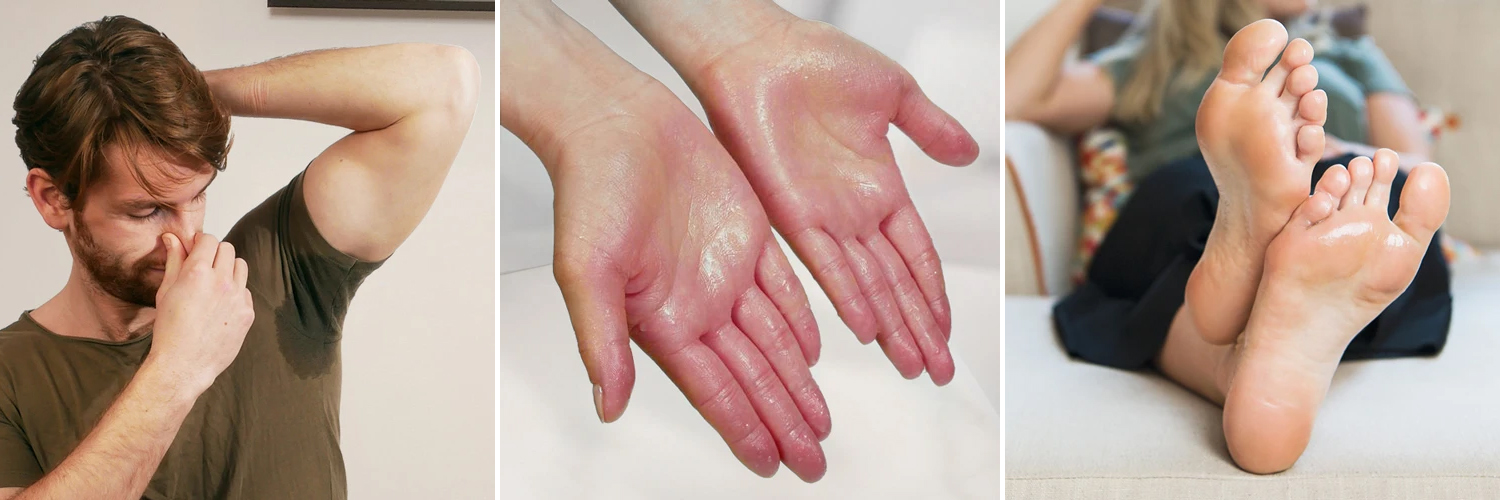Expert Dermatology Solutions for Treatment of Hyperhydrosis of Hands: Comprehensive Overview
Expert Dermatology Solutions for Treatment of Hyperhydrosis of Hands: Comprehensive Overview
Blog Article
Comprehending the Origin of Excessive Sweating and Its Influence On Daily Life
While it is frequently recognized as a physical response to manage body temperature level, the triggers for excessive sweating can vary widely among people, incorporating not just physical variables however psychological and likewise psychological elements. By delving into the origin triggers of hyperhidrosis and discovering its multifaceted results, a deeper understanding of this prevalent issue can be obtained, losing light on the complexities that people grappling with too much sweating navigate on an everyday basis.
Physiology of Sweat Glands
The regulation of sweat production, a vital physiological procedure, is primarily regulated by the task of gland dispersed across the human body. Sweat glands are classified into 2 primary types: eccrine and apocrine glands. Eccrine glands are the most numerous and are discovered in nearly all areas of the body. They play an essential function in thermoregulation by secreting a watery fluid onto the skin's surface, which evaporates and aids cool the body down. In comparison, apocrine glands are focused in locations abundant in hair follicles, such as the underarms and groin, and their secretions are thicker and milky in appearance.
When the body temperature level increases, either as a result of physical task, heats, or emotional stress, the nerve system triggers the gland to create sweat. This sweat is made up mainly of water and electrolytes like salt and chloride. The procedure of sweat manufacturing is crucial for preserving the body's inner temperature level within a narrow, optimum variety, highlighting the important function gland play in human physiology.
Triggers for Excessive Sweating
In comprehending the source of excessive sweating, it is essential to recognize the triggers that can lead to this physical reaction. Excessive sweating, likewise referred to as hyperhidrosis, can be prompted by numerous elements, both physical and environmental. One typical trigger is emotional anxiety or stress and anxiety, which can stimulate the body's gland to generate more sweat than is needed for cooling. Physical physical effort, heats, and spicy foods are also recognized to activate extreme sweating in people susceptible to this condition. Particular clinical conditions like diabetes, hyperthyroidism, or menopause can contribute to excessive sweating as well.
In addition, medications such as some antidepressants, opioids, and specific supplements can also serve as triggers for hyperhidrosis. Comprehending these triggers is crucial in managing too much sweating efficiently - Treatment for hyperhydrosis of hands. By determining and attending to the particular triggers that motivate too much sweating in a private, doctor can develop customized treatment plans to relieve this condition and enhance the individual's top quality of life
Medical Conditions Associated
Linked with extreme sweating are different medical conditions that can intensify this physiological response. One common problem is hyperhidrosis, a condition identified by unusually increased sweating that goes beyond the body's thermoregulatory requirements. This can manifest in focal locations like the hands, soles, underarms, or face, affecting a person's lifestyle because of social embarrassment and discomfort.
In addition, endocrine disorders such as hyperthyroidism, diabetic issues, and menopausal warm flashes can likewise bring about excessive sweating. Hyperthyroidism creates an overflow of thyroid hormonal agents, accelerating metabolic rate and activating sweating. Diabetes mellitus can induce sweating episodes, particularly during hypoglycemic episodes when blood sugar level levels drop too navigate here low. Menopausal hot flashes, credited to hormone changes during menopause, can cause sudden and intense sweating, often come with by flushing and heart palpitations.
Furthermore, infections like consumption, endocarditis, and hiv have been connected with evening sweats, a common sign understood to interfere with sleep and influence general visit here wellness. These clinical conditions highlight the varied variety of underlying variables that can contribute to too much sweating, requiring extensive assessment and monitoring by medical care professionals.
Emotional and Emotional Factors

Influence On Social Communications
Too much sweating can have profound effects on an individual's ability to involve easily in social communications. The visible indicators of sweat stains or damp patches on clothing can result in humiliation and self-consciousness, triggering individuals to take out from social situations. This withdrawal can influence relationships, limit social additional resources activities, and impede personal and expert growth.

Furthermore, the anxiety and self-confidence issues stemming from extreme sweating can influence communication and interpersonal skills. People may have a hard time to concentrate on discussions, get involved in group activities, or reveal themselves confidently. This can lead to feelings of seclusion and loneliness, as social links come to be testing to preserve.
Conclusion

While it is generally recognized as a physical reaction to manage body temperature, the triggers for extreme sweating can vary widely among people, encompassing not just physical factors however likewise emotional and mental aspects. By diving into the root causes of hyperhidrosis and exploring its multifaceted impacts, a much deeper understanding of this pervasive problem can be gotten, dropping light on the intricacies that people grappling with excessive sweating navigate on a day-to-day basis.
Physical effort, high temperatures, and spicy foods are likewise recognized to set off extreme sweating in people prone to this problem. By recognizing and dealing with the certain triggers that trigger excessive sweating in a specific, health care suppliers can establish personalized treatment strategies to ease this condition and enhance the individual's top quality of life.
Extreme sweating can have profound effects on a person's ability to engage conveniently in social interactions.
Report this page